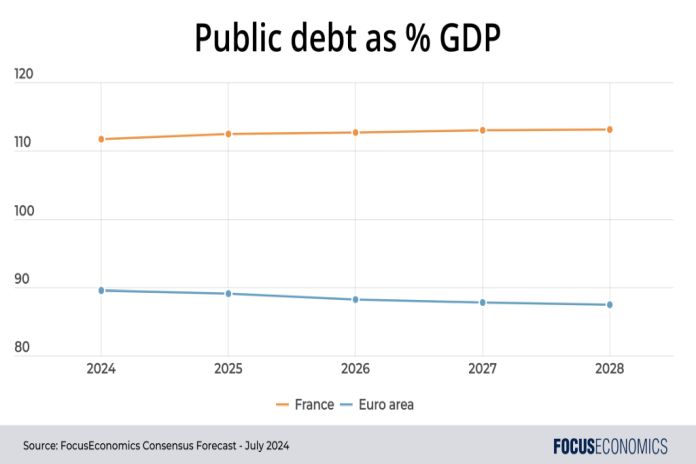-
-
- Next French parliament likely to be skewed toward the political extremes
-
By FocusEconomics
PARIS, France – On 30 June, French citizens voted in the first round of parliamentary elections, with the right-wing National Rally (RN) party and a coalition of multiple left-wing parties both obtaining a higher national vote share than president Macron’s centrist political movement, which had been by far the largest party in the outgoing parliament.
A second round 7 July. Tactical voting will likely feature heavily: As such, governments led by the RN, the left-wing coalition or Macron’s own party with or without absolute seat majorities are all possibilities.
Muted current economic conditions
The next administration will be faced with a challenging in-tray. The European Commission recently opened an excessive deficit procedure against France; the country’s budget deficit is forecast to be close to 5 percent of GDP this year, above the 3 percent limit set by Brussels. This came just after S&P Global Ratings’ decision to cut France’s credit rating in late May due to the large budget shortfall and a public debt that is the third-highest in the Eurozone as a share of GDP. Overall economic growth is minimal, and barely positive in per-capita terms.
France’s economic forecasts are weak
Our panelists’ base case is for the French economy to muddle through in the coming years, with GDP growth seen below the Euro area average out to 2028 despite relatively strong demographics, and the fiscal deficit and public debt elevated at over 3 percent and 110 percent of GDP respectively.
Both RN or left-wing administrations, if they emerge could push these deficit and debt numbers higher; both have talked about boosting spending, and the RN has also floated tax cuts. But even if they have the numbers in Parliament to pass such plans, pressure from the European Commission to comply with the EU’s deficit ceiling could give political leaders pause for thought. Failing that, financial markets will impose their own limits on the government’s ability to loosen its fiscal stance, such as occurred with Liz Truss namely, by dumping government bonds, in turn leading to surging bond yields and debt ratings downgrades. In sum: France’s current economic projections are not exactly rosy, and could get considerably worse depending on the results of the elections.
Insight from our analyst network
On the political outcome, EIU analysts said:
“We believe that the most likely outcome […] is another hung parliament with a prime minister coming from a broader alliance of republican parties. […] Moderate voters, especially older ones, will probably fear the prospect of a far-right prime minister, while traditional parties tend to do better in the legislative polls. Nonetheless, given the level of support for far-right parties in the polls, Macron’s decision is a huge political gamble, and the risk of a cohabitation scenario with a far-right prime minister is very high.”
Goldman Sachs analysts commented on fiscal policy:
“[Under a status-quo electoral outcome] we assume a gradual improvement in the fiscal balance with some slippage relative to the government’s guidance and the 10-year spread to Germany falling back to its pre-dissolution level of 50bp. We then consider a deadlock scenario in which a hung parliament does not allow any political group to pass meaningful tax or spending measures. Past reforms and the improvement in economic activity could still allow the primary balance to improve slightly, but borrowing spreads would remain at […] 75bp. […] Lastly, we consider a scenario in which either the far-right or the left coalition secures an absolute majority and is able to deliver a sizeable fiscal expansion. We assume that the primary balance is -2pp of GDP, more negative than in our baseline, and borrowing spreads widen further to 100bp.”
Our latest analysis
- New Zealand’s economy remained sluggish in Q1, with output falling in per capita terms.
- The Bank of England held rates steady in June, though rate cuts will come later this year.





